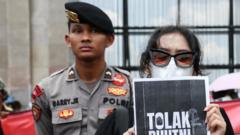As Indonesia grapples with a significant legal shift allowing the military greater involvement in governance, citizens fear a return to the oppressive Suharto regime.
**Indonesia's Military Law Revision Sparks Outrage and Fears of Authoritarianism**

**Indonesia's Military Law Revision Sparks Outrage and Fears of Authoritarianism**
Major changes to Indonesia's military legislation have incited widespread protests and concern over potential backsliding into authoritarianism.
The Indonesian parliament has controversially approved changes to military legislation, significantly expanding the military's role in government. Critics, including pro-democracy activists, are alarmed that these alterations could signal a regression to the oppressive days of Suharto’s dictatorship, which reigned for 32 years until 1998. The reforms, championed by President Prabowo Subianto, a former special forces commander and Suharto's son-in-law, now permit military officers to assume civilian government positions without resigning from their military duties.
Protests erupted outside the parliament building, with hundreds of activists rallying against what they perceive as an assault on democracy. "The essence of democracy is that the military should not engage in politics," stated activist Wilson from the Indonesian Association of Families of the Disappeared (KontraS), highlighting fears of political militarization. The law enables active military personnel to hold positions across 14 civilian institutions, increasing the retirement age for senior military ranks, allowing generals to serve until 63.
By Thursday evening, the protestors had swelled to nearly a thousand, brandishing banners denouncing militarism and oligarchy. Law enforcement, including police and military personnel, monitored the demonstrations as they unfolded. Despite attempts over the past two decades to limit military influence in governance, reports indicate that nearly 2,600 active officers occupied civilian roles prior to the legislation’s amendment.
Analysts regard these legal changes as emblematic of a broader consolidation of power under President Prabowo. The endorsement of these revisions by the main opposition party further emphasizes this shift. "Embedding military perspectives into civilian domains could reshape Indonesia’s policy direction, prioritizing stability over democratic governance," commented Dedi Dinarto, an analyst at Global Counsel.
Historically, the military’s “dual function” was integral to Suharto’s regime, characterizing his administration’s pervasive control over security and governance. For many Indonesians, Prabowo symbolizes this authoritarian past, having led a unit accused of brutal crackdowns on activists during the 1990s. His administration has already shown an inclination to intertwine military roles with public programs, exemplified by a $4bn initiative providing meals for children and pregnant women, which relies on military logistics.
Defending the amendments, Defense Minister Sjafrie Sjamsoeddin cited the need for military evolution to address contemporary and emerging threats. However, critics argue that the increasing military control over public affairs endangers impartial governance. Concerns have been raised regarding the potential loss of accountability should active military members occupy roles within the justice system, as raised by Virdika Rizky Utama from PARA Syndicate.
Human Rights Watch's researcher Andreas Harsono warned that Prabowo’s agenda seems intent on reinstating military authority over civil society, potentially resurrecting a climate characterized by widespread abuses. KontraS criticized the government’s expedited amendments as contradictory to its stated human rights commitments.
Yet activists remain unyielding. "We will continue protesting until we claim victory... we have no choice but to occupy the 'house of the people'," emphasized Sukma Ayu, an undergraduate involved in the demonstrations. As tensions rise, the struggle for Indonesia’s democratic principles faces a pivotal moment.
Protests erupted outside the parliament building, with hundreds of activists rallying against what they perceive as an assault on democracy. "The essence of democracy is that the military should not engage in politics," stated activist Wilson from the Indonesian Association of Families of the Disappeared (KontraS), highlighting fears of political militarization. The law enables active military personnel to hold positions across 14 civilian institutions, increasing the retirement age for senior military ranks, allowing generals to serve until 63.
By Thursday evening, the protestors had swelled to nearly a thousand, brandishing banners denouncing militarism and oligarchy. Law enforcement, including police and military personnel, monitored the demonstrations as they unfolded. Despite attempts over the past two decades to limit military influence in governance, reports indicate that nearly 2,600 active officers occupied civilian roles prior to the legislation’s amendment.
Analysts regard these legal changes as emblematic of a broader consolidation of power under President Prabowo. The endorsement of these revisions by the main opposition party further emphasizes this shift. "Embedding military perspectives into civilian domains could reshape Indonesia’s policy direction, prioritizing stability over democratic governance," commented Dedi Dinarto, an analyst at Global Counsel.
Historically, the military’s “dual function” was integral to Suharto’s regime, characterizing his administration’s pervasive control over security and governance. For many Indonesians, Prabowo symbolizes this authoritarian past, having led a unit accused of brutal crackdowns on activists during the 1990s. His administration has already shown an inclination to intertwine military roles with public programs, exemplified by a $4bn initiative providing meals for children and pregnant women, which relies on military logistics.
Defending the amendments, Defense Minister Sjafrie Sjamsoeddin cited the need for military evolution to address contemporary and emerging threats. However, critics argue that the increasing military control over public affairs endangers impartial governance. Concerns have been raised regarding the potential loss of accountability should active military members occupy roles within the justice system, as raised by Virdika Rizky Utama from PARA Syndicate.
Human Rights Watch's researcher Andreas Harsono warned that Prabowo’s agenda seems intent on reinstating military authority over civil society, potentially resurrecting a climate characterized by widespread abuses. KontraS criticized the government’s expedited amendments as contradictory to its stated human rights commitments.
Yet activists remain unyielding. "We will continue protesting until we claim victory... we have no choice but to occupy the 'house of the people'," emphasized Sukma Ayu, an undergraduate involved in the demonstrations. As tensions rise, the struggle for Indonesia’s democratic principles faces a pivotal moment.



















